


We didn’t get our usual Winter issue out before the equinox, so welcome to a special one-time Early Spring issue. We’ll take a look at recent ICORD papers on axon regeneration and ultrasound, highlight some significant awards to ICORD faculty and trainees, and recap a couple of great events. Plus, our regular features: help us do research, what’s new at ICORD-O, and Partner News!
We hope you enjoy these stories:
- Why don’t adult nerve cells regenerate?
- Prestigious award for ICORD Director
- Using ultrasound to measure muscle strength
- ARM recap
- King Charles III medals for SCI research trailblazers
- 2025 Trainee Award winners
- Gabriel Dix continues to inspire
- Future scientists inspired!
- Celebrating SCIRE’s 20th anniversary
And these regular columns:
Paper explores why adult axons don’t regenerate
By Jocelyn Chan
ICORD researcher and Assistant Professor in the UBC Department of Cellular and Physiological Sciences, Dr. Brett Hilton recently co-authored a Nature Reviews Neuroscience article exploring a key question in SCI research: why don’t adult nerve cells (i.e. neurons) regenerate?
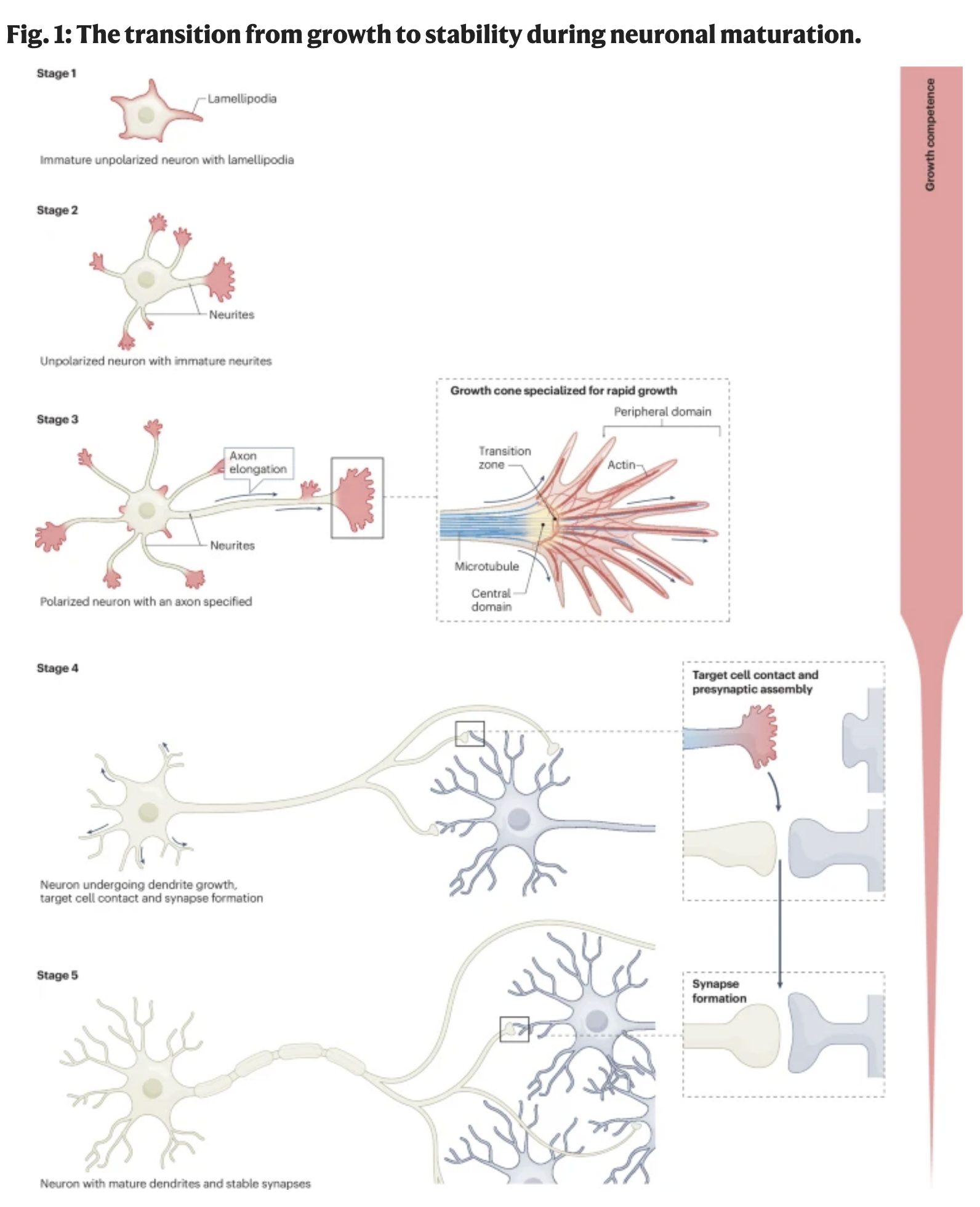
Image from Dr. Hilton’s paper (above) illustrates how neurons mature.
One of the main reasons why paralysis, sensory dysfunction, and autonomic dysfunction occur after SCI is that long projecting nerve cell processes, called axons, fail to regenerate when they are injured. SCI therefore disrupts communication between the brain and the rest of the body, and the Hilton Lab is interested in understanding why axon regeneration fails and what can be done to boost regeneration and functional recovery following injury.
While adult nerve cells fail to regenerate, immature or newly-born nerve cells have a remarkable ability to grow axons and to regenerate. In other words, nerve cells lose the ability to regenerate axons as they mature. In recent years, more and more researchers have been making discoveries that indicate that this is not merely a correlation: that many of the intracellular processes in nerve cells that are involved in maturation of the neuron are actually inhibiting regeneration.
This review highlights multiple cellular mechanisms that contribute to this fixed state, including changes in gene regulation, intracellular transport, and the cytoskeleton (the internal scaffolding of cells). One particularly promising area of research involves manipulating the epigenetic controls that switch off growth-related genes in adult neurons. By targeting these controls, researchers hope to temporarily revert mature neurons to a more “youthful” state, just enough to allow for regeneration.
“This review summarizes the idea that to truly regenerate axons over long distances, we’ll need strategies that target neuronal maturation,” explained Dr. Hilton. “Our lab is especially interested in targeting this at the level of gene expression—forcing mature neurons to become more immature so that they can regenerate following spinal cord injury.”
ICORD Director receives UBC’s premier award for research 
ICORD Director Dr. Brian Kwon has received the Jacob Biely Faculty Research Prize for 2024. This prestigious award, UBC’s premier award for research, recognizes his outstanding contributions as a surgeon-scientist to spinal cord injury research. Dr. Kwon is the first recipient of this prize from the Department of Orthopaedics and the seventh from the Faculty of Medicine. Read the full story here.
Using ultrasound to measure muscle strength
By Jocelyn Chan
A paper by members of ICORD’s Berger Lab, published in Muscle & Nerve, has shown that ultrasound is a good biomarker for strength. The study investigates how well ultrasound measurements of muscle size, such as cross-sectional area and muscle thickness, can predict isometric muscle strength in the arm and hand.
 The paper’s first author, Christina Whang, is in the Experimental Medicine program at UBC. While doing an undergraduate degree in kinesiology at UBC Vancouver, she worked in labs focused on skill learning, motor behaviour, and health and exercise psychology. After developing an interest in clinical populations during her undergraduate neuroanatomy classes, she joined Dr. Michael Berger’s lab to explore how muscle health can be assessed using non-invasive techniques like ultrasound.
The paper’s first author, Christina Whang, is in the Experimental Medicine program at UBC. While doing an undergraduate degree in kinesiology at UBC Vancouver, she worked in labs focused on skill learning, motor behaviour, and health and exercise psychology. After developing an interest in clinical populations during her undergraduate neuroanatomy classes, she joined Dr. Michael Berger’s lab to explore how muscle health can be assessed using non-invasive techniques like ultrasound.
Her recently published study in Muscle & Nerve (her first publication as first author!) investigates how well ultrasound measurements of muscle size, such as cross-sectional area and muscle thickness, can predict isometric muscle strength in the arm and hand. Isometric strength refers to how much force a muscle can produce without moving, like when you push against a wall. “We used ultrasound to look at muscles of different shapes and sizes, then compared those measurements to how much force participants could produce with that muscle,” Christina explained.
The study found that ultrasound is most accurate when used to measure strength in larger, more geometrically shaped muscles like the biceps and triceps. For smaller or irregularly shaped muscles, like those in the hand, ultrasound was still useful but less precise. “It’s not a one-size-fits-all tool,” she said. “It depends on the muscle’s shape and location.
“These findings are important because traditional methods of assessing muscle strength, like manual muscle testing, can be difficult to use in clinical populations such as people with spinal cord injuries. “Ultrasound doesn’t require the person to actively push or pull, which could make it a valuable tool for clinicians assessing muscle health in individuals with limited mobility,” she noted.
“This study was conducted with uninjured populations. It would be interesting to explore how ultrasound applies to people living with SCI who may have altered muscle quality,” shared Christina.
Building on this work, her current thesis research focuses on understanding why people with SCI experience greater muscle fatigue. Using various electrical stimulation techniques, she hopes to map out which parts of the brain-to-muscle pathway are most affected.

Fun fact: Christina is also a dancer, and currently performs with the Vancouver-based team TwoFourSeven Company. “I love dancing because it challenges me mentally, physically, and emotionally,” she shared. “I’ve enjoyed competing with my team on national and international stages!”
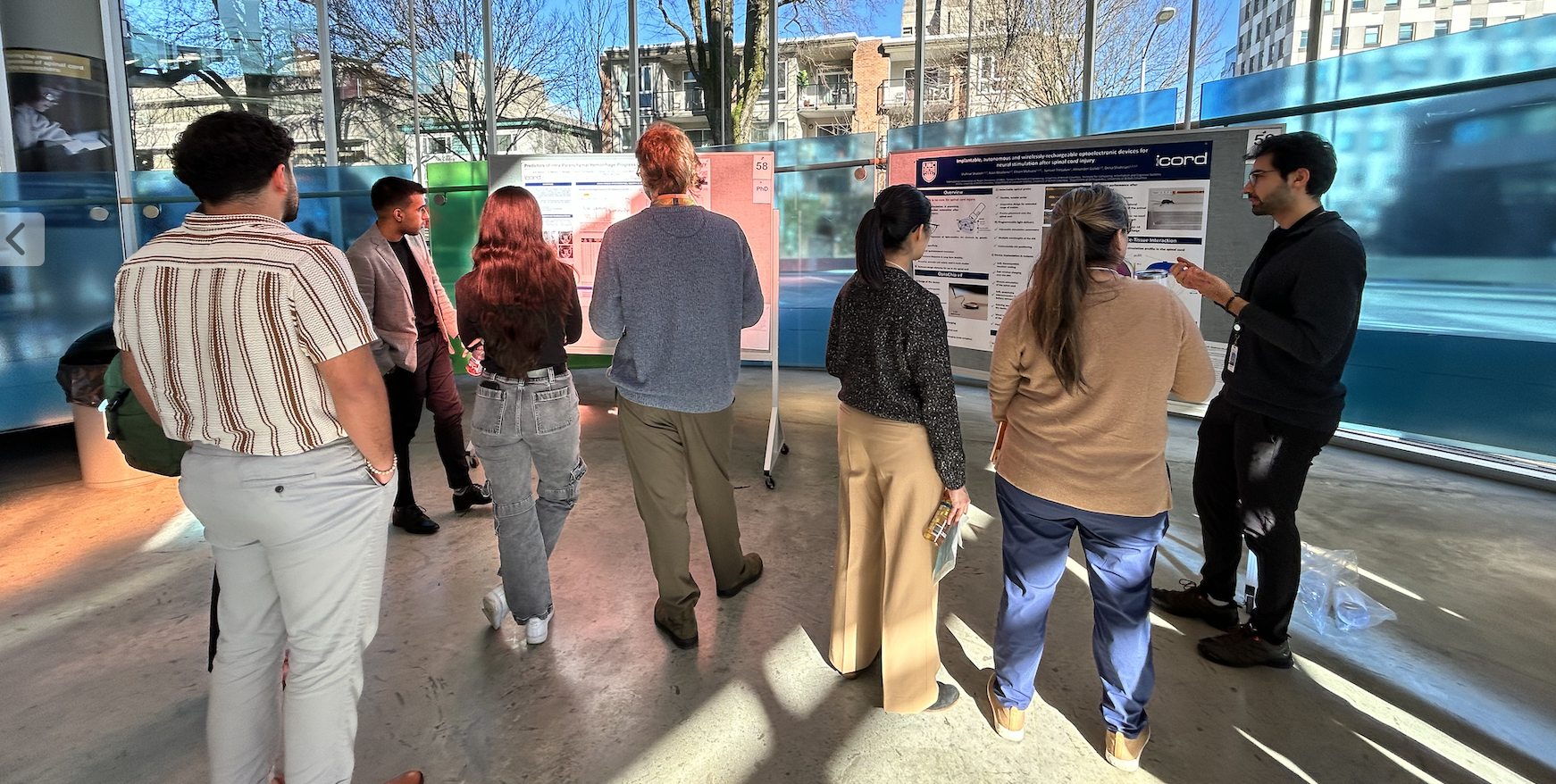
Annual Research Meeting #22
done & dusted
Generously supported by the Rick Hansen Foundation for 22 years, ICORD’s Annual Research Meeting (ARM) is a chance for faculty, trainees, staff, and partners to reconnect, learn about each others’ work, and forge new connections and collaborations. This year’s event combined the ARM and ICORD Trainee Symposium, with 180 people taking part over two full days. The event included keynote lectures by Dr. Shelly Sakiyama-Elbert of the University of Washington and Dr. James Guest of the University of Miami.
Research talks were presented by Drs. Stacy Elliott, Dena Shahriari, John Kramer, Femke Hoekstra, Louis-Pierre Auger, Numaira Obaid, Paulina Scheuren, and Sophie Stukas. Seven trainees from undergraduate to PhD gave 3-minute overviews of their work, and our partners in the Blusson Spinal Cord Centre presented a session as well. The meeting featured 78 posters, which is a new record! The event also included a trainee-focussed lecture on Translational Research, a workshop on supervisory skills, and a career panel.
featured 78 posters, which is a new record! The event also included a trainee-focussed lecture on Translational Research, a workshop on supervisory skills, and a career panel.
Thanks to everyone who participated, spoke, judged posters, and helped with planning and logistics.

Composite “speaker’s eye view” of the ARM by Brian Kwon
ICORD’s Annual Research Meeting would not be possible without the continued and generous support of the Rick Hansen Foundation.
ICORDians receive King Charles III Coronation Medals
Drs. Stacy Elliott, Andrei Krassioukov, Brian Kwon, Wolfram Tetzlaff and Marcel Dvorak have received King Charles III Coronation Medals as Spinal Cord Injury Research Trailblazers. This honour recognizes Canadians who have made a lasting impact in communities, territories, regions, and provinces across the country. The medal was created to mark the coronation of King Charles III in 2023 and is the first Canadian honour to feature the Canadian Royal Crown, approved by His Majesty. It is administered by the Chancellery of Honours in partnership with the Royal Canadian Mint. Nominated by the Rick Hansen Foundation, Stewart and Marilyn Blusson, Michael Fehlings, Michael Harcourt, George and Sylvia Melville, and Charles Tator were also honoured in this category. Read the full press release.
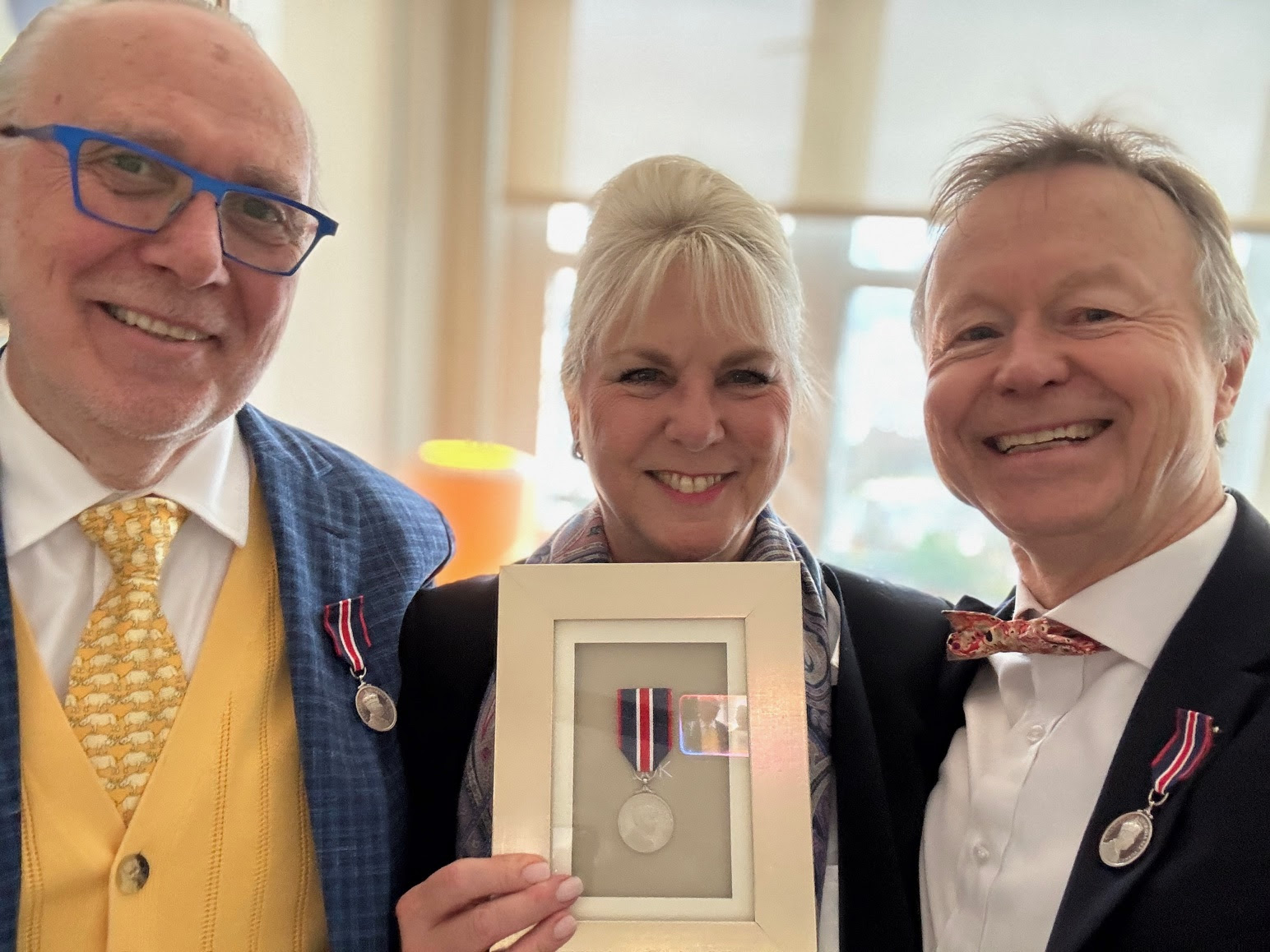
L-R: Dr. Krassiouikov, Dr. Elliott, and Dr. Tetzlaff with their medals
Meet the 2025 ICORD Trainee Award winners!
Trainee Awards are intended to recognize those attributes – beyond excellence in publications and presentations – that make a trainee or scientist outstanding. The awards highlight achievements in four distinct and important areas: service to others, work in SCI community, mentoring of trainees, and perseverance/resilience in the face of external life events.
 |
The Gabriel Dix SCI Community Award honours individuals actively making a difference in the lives of people living with SCI. This year’s award was presented to Emily Giroux, a PhD student with Dr. Heather Gainforth in the final year of her Ph.D. Emily is an impressive academic with a strong passion for doing research that serves communities. A cornerstone throughout all of her degrees has been a commitment to volunteering and serving SCI and disability organizations locally, provincially, and nationally. This award is named for Gabriel Dix, a former trainee and staff member in the Martin Ginis Lab before his death in 2021 (see story below). |
 |
The Wolfram Tetzlaff Mentorship Award acknowledges postdocs and PhD students who consistently go above and beyond to guide and support trainees. The award acknowledges the hard work and dedication of these mentors to make students feel supported and encouraged. This year’s award was presented to Dr. Bethany Kondiles, a postdoc in Dr. Tetzlaff’s lab. Bethany has mentored over 20 undergraduate and high school students since 2021, creating a wonderful learning experience that has built confidence and success among her mentees. This award is named for Dr. Wolfram Tetzlaff, who served as director of ICORD from 2012 to 2023. |
 |
The ICORD Trainee Outstanding Service Award recognizes trainees who have made outstanding contributions to the ICORD community. This year’s award was presented to Xueqing Zhou, a PhD student in Dr. Tania Lam’s lab. Xueqing has held the position of Community Outreach Lead with the ICORD Trainee Committee since she was a first-year grad student. In addition to coordinating numerous ICORD tours, she has co-led and/or supported multiple trainee events, including meetICORD, ICORD Trainee Symposium, Volunteer Expo, etc. Xueqing also represents ICORD on the VCHRI-wide trainee committee to facilitate cross-centre communication and trainee development opportunities. |
 |
The Peggy Assinck Award recognizes ICORD students who best exemplify perseverance, dedication, resilience and passion for SCI research. In particular, it intends to recognize those outstanding individuals in the ICORD community who are managing extenuating forces such as health complications, interpersonal issues, or life circumstances, who may not be receiving the standard accolades because of factors outside of their control. This year’s award was presented to Robert Buren, a 3rd year PhD student with Dr. Kathleen Martin Ginis, who is determined to solve the devastating problem of SCI neuropathic pain. Robert was nominated for his determination, perseverance, and academic accomplishments. This award was named for scientist and para-athlete Peggy Assinck, who completed her PhD with Dr. Wolfram Tetzlaff in 2016. |
Gabriel Dix continues to inspire
by Emily Giroux

My name is Emily Giroux. I’m an ICORD Trainee with the Gainforth Lab in the final year of my PhD, and I received the 2025 Gabriel Dix SCI Community Award. That’s me in the picture above, with Dr. Gainforth and Dr. Kathleen Martin Ginis. The Gabriel Dix Award speaks to the value of making a difference in people’s lives. I cannot think of a better person for this award to be named after, and it is the greatest honour to be mentioned in any capacity alongside Gabriel, or Gabe as so many of us called him.
I had the privilege of working with Gabe when he was an ICORD Trainee in the lab of Dr. Martin Ginis. We became great friends in the year leading up to his unexpected death. His work ethic was outstanding, but more importantly, his kindness, generosity, and sense of humour were unmatched by anyone I have ever met. I don’t think there was ever a time that I was hanging out with Gabe where he wasn’t rushing between volunteering, supporting colleagues across labs at UBC-O, or just being a good friend. Not only that, but he was present and engaging everywhere he went.
Gabe was a shining example of how we can give back to the communities that we, as researchers, aim to support through our work. I will forever be grateful that our paths crossed, and everyone who Gabe touched during his time on Earth would echo the same testament. To past and future recipients of this award: please know the honour that it brings to be named alongside someone who truly made a difference in people’s lives, and continues to do so day after day, even though he is no longer with us in person.
Gabe – We miss you and we love you.

Gabe and me enjoying a perfect day on Lake Okanagan
Future scientists inspired!
The Blusson Spinal Cord Centre atrium was full of excited kids on Tuesday, February 11 for ICORD’s Celebration of the UN International Day for Women and Girls in Science. More than 100 people attended the event, which included interactive displays by Science World, Ethos Lab, Gynecologic Cancer Initiative, STEMCELL Technologies, Geering Up, seed2STEM, and the UBC MRI Research Centre, as well as ICORD’s Tetzlaff Lab and Orthopaedic and Injury Biomechanics Group!
Thanks again to everyone who enthusiastically volunteered to help make this fun event happen.

SCIRE is 20!
SCIRE (Spinal Cord Injury Research Evidence) just celebrated its 20th anniversary. SCIRE’s mission remains to produce material based on the best and most current evidence so that clinicians and people with SCI can make informed decisions about their care.

Subscribe to SCIRE’s YouTube channel.
Visit SCIRE Community for information about SCI research that is written in everyday language.
A paper:
The Gainforth Lab, in collaboration with the ISCOS Physical Activity Special Interest Group, recently published a paper aimed at raising the overall quality of physical activity and SCI research worldwide. ICORDians Jasmin Ma and Matteo Ponzano contributed to the work, along with ICORD alumnus Tom Nightingale and Praxis’s James Laskin.
A fellowship:
Congratulations to Dr. Kenneth Noguchi, who was recently awarded a SSHRC Postdoctoral Fellowship. His upcoming research will focus on quality participation and physical activity among people with SCI and other types of physical disabilities.
A new faculty position:
Congratulations to Dr. Matteo Ponzano, who has accepted a tenure-track position at Wayne State University in Detroit.
A conference:
The ABC lab attended the the Society of Behavioral Medicine’s 46th Annual Meeting & Scientific Sessions in San Fransisco. The team left the conference ready to increase the impact of our work, individually and through the bridges that build in our work with icord and community at large.
An award:
Congratulations to Parres Holliday (pictured, below) who was recently awarded first place for her poster presentation (Masters) at the ICORD ARM!

Help us do research
Interested in helping ICORD researchers make SCI preventable, livable, and curable? These research studies (and more) are in need of participants!
Pelvic floor muscle physiotherapy
Researchers in Dr. Tania Lam’s lab are studying whether pelvic floor physiotherapy can improve bladder, bowel, and sexual function in people with motor-incomplete SCI. The 12-week program includes guided and at-home sessions to explore its potential benefits. Read More…
Vestibular experience
Researchers in Dr. Tania Lam’s lab are exploring how the vestibular system adapts to new movement patterns after SCI by tracking body motion during everyday tasks using wearable sensors. The findings may support the development of therapies to improve balance. Read More…
Recreational Adaptive Devices (RAD)
Researchers in Dr. Ben Mortenson and Dr. William Miller’s labs are studying the impact of an adaptive equipment loan program in Langford, BC, designed to support outdoor recreation for people with mobility impairments. Participants will try the program and share feedback through two short interviews. Read More…
Fear of falling and exercise self-efficacy in people with neurological disabilities who can walk
Dr. Kathleen Martin Ginis’ team is studying how balance, strength, and mobility relate to fear of falling and confidence in exercise among people with SCI or MS who walk as their primary mode of mobility. Participants will complete physical tests and questionnaires in one visit. Read More…
Click here to browse all the ICORD studies currently recruiting participants.
Interested in participating in ICORD research but feeling overwhelmed by the number of studies?
Our Study Liaisons are here to help!
Interested in participating in ICORD research but feeling overwhelmed by the number of studies? Meet our new study liaisons, Sam Do uglas and Ali Williams!
uglas and Ali Williams!
Ali is the manager of Dr. Tania Lam’s Human Locomotion Lab, and Sam is an IT Support Analyst at Praxis Spinal Cord Institute.
Sam and Ali will work with you to narrow down what studies you may be eligible for. Over a few short phone calls, they will ask you questions about your research interests as well as common study inclusion and exclusion criteria. From there, they will tailor a list of research studies for you and provide details and contact information for each one. They can also directly connect you with study coordinators if you like.
Send them an email to begin your consultation!
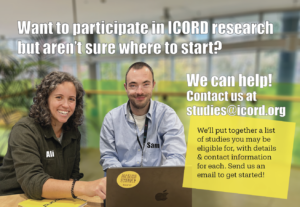
Partner news
 Charity Challenge
Charity Challenge
It’s time to get ready for another year of wheeling, walking and running! The annual Charity Challenge fundraising event is a great way to stay fit, have fun and help raise money for Spinal Cord Injury BC (SCI BC). All funds raised will go towards SCI BC’s Peer Program and Information Services which means that participants will be supporting the SCI community in BC.
From June 1 to 30, people from all over BC can participate in this year’s Charity Challenge. The virtual race takes place all month long and you can take part in the challenge from wherever you live! You can also choose to participate in the big in-person race at the Vancouver Half Marathon on June 22.
Join Team SCI BC today by emailing Krystyna at kpangilinan@sci-bc.ca to register or visit the Charity Challenge website for more information.
 Care outcomes improve through best practices
Care outcomes improve through best practices
Watch a recent workshop video highlight to see how Praxis BC Interior Outreach is bringing best practices for SCI care to remote and rural practitioners. By incorporating lived experiences, local SCI care is being strengthened across the region. Through a series of targeted educational sessions led by James Hektner, BC Interior Regional Community Liaison, and Shannon Rockall, BC Interior Clinical Liaison, healthcare providers are gaining critical insights from panel discussions with individuals with lived experience (PLEX). These sessions aim to address the lack of specialized SCI services by empowering clinicians with the latest best practices and priorities from within the SCI community.
These initiatives are designed to provide clinicians with the knowledge and tools they need to better serve individuals with SCI in their communities.For more information, contact info@praxisinstitute.org
Spinal Moves Podcast!
Praxis and the Activity-Based Therapy Community of Practice (ABT CoP) relocate Spinal Moves to YouTube, a podcast exploring activity-based therapy (ABT) for SCI rehabilitation, featuring discussions with individuals with lived experience, clinicians, and researchers.
Listen here.


SHRS is 50!
Congratulations to Vancouver Coastal Health’s Sexual Health Rehabilitation Service (SHRS) who celebrated their 50th anniversary in February! As the only comprehensive sexual health and reproductive service of its kind in Canada, the SHRS team offers specialist clinical services at the GF Strong Rehabilitation Centre and Blusson Spinal Cord Centre, which anyone in BC/Yukon Territory with neurological impairments or illnesses can access. Learn more about the SHRS at vch.ca/en/service/sexual-
 Save the Date: VCHRI Research Summit 2025
Save the Date: VCHRI Research Summit 2025
Join us on June 2 at VGH Paetzold Auditorium for the VCHRI Research Summit 2025. This premier event will bring together researchers, health professionals, industry leaders and community members to explore groundbreaking advancements and bold solutions to today’s most pressing health challenges. This year’s summit will spotlight innovative strategies to improve access to care, reduce health inequities and accelerate breakthroughs through technology and precision medicine.
Full program and registration details coming in April. Stay tuned! www.vchri.ca

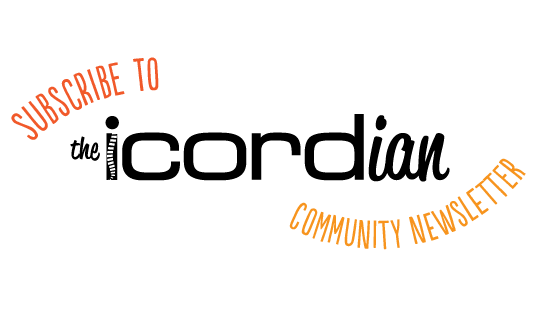 Thanks for reading this issue of The ICORDian – we hope you enjoyed it! Please subscribe and have future issues delivered to your inbox. If you have any comments about this issue or suggestions for future ones, please contact us.
Thanks for reading this issue of The ICORDian – we hope you enjoyed it! Please subscribe and have future issues delivered to your inbox. If you have any comments about this issue or suggestions for future ones, please contact us.
|
Jocelyn Chan, Brett Hilton, Christina Whang, Emily Giroux, Brian Kwon, Katie Ashwell, and Cheryl Niamath for their contributions to this issue of our newsletter.
|







